Choosing the correct plate material for your mechanical keyboard could also significantly change the typing sound and experience of it.
The mechanical keyboard plate sits on top of the PCB for extra support and helps reduce keyboard flexing, adding stability.
Not all keyboards have this part, distinguishing them from those with the switch mounted configuration.
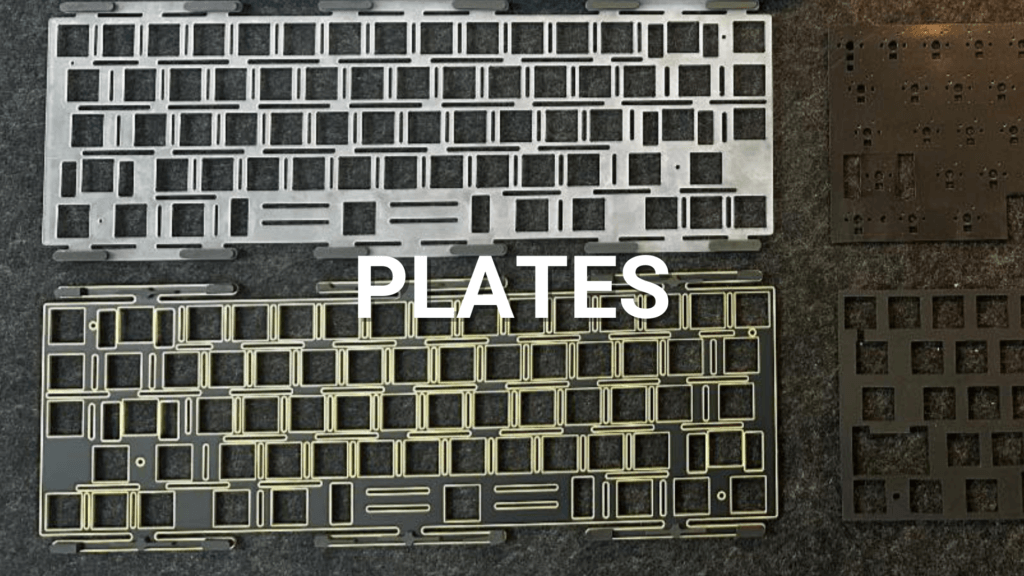
Different Plates Offer Different Sounds and Feelings
The sound that a mechanical keyboard makes when typing can be influenced by a variety of factors, including the type of switches being used, the type of plate material, and the overall design of the keyboard.
Some common materials used for mechanical keyboard plates include aluminum, brass, polycarbonate, and carbon fiber. Each of these materials has its own unique properties that can affect the sound of the keyboard when typing.
For example, aluminum plates are known for providing a crisp and precise sound, while brass plates can give the keyboard a more “thocky” or resonant sound. Polycarbonate plates may produce a slightly softer or more muted sound, while carbon fiber plates can give the keyboard a more pronounced and “tactile” feel when typing.
It is important to note that the sound of a mechanical keyboard can also be influenced by other factors, such as the type of switches being used, the design of the keyboard, and the overall build quality. Some users may prefer a specific type of sound when typing, while others may not be as concerned about the sound of the keyboard. Ultimately, the best mechanical keyboard for you will depend on your personal preferences and needs.
All Mechanical Keyboard Plate Types
Common plate materials for custom mechanical keyboards include aluminum and brass. Many people who build their own keyboards opt to CNC or 3D print their own plates.
However, there are many other plate materials available, so it’s worth experimenting to find out which one works best for you.
It’s also important to consider the case and switch materials, as these will have an effect on the overall sound and feel of your keyboard.
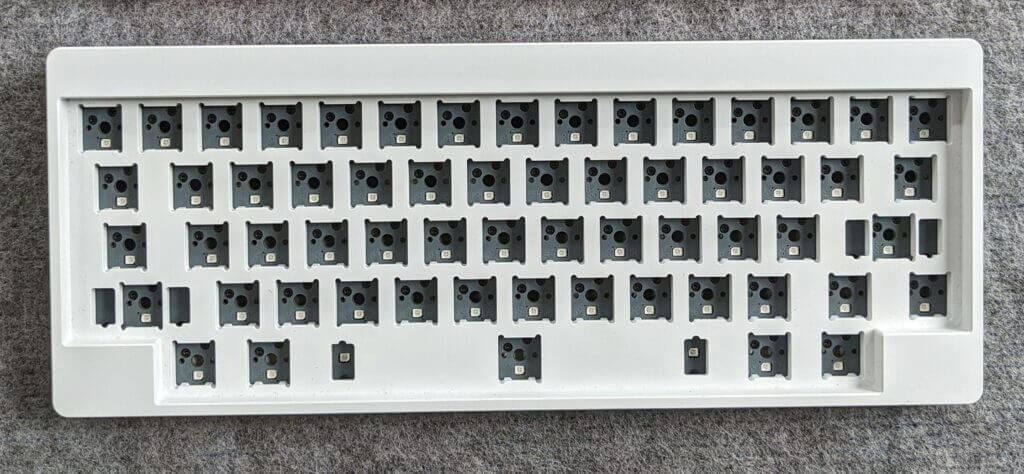
Aluminum Plate
There are several advantages to using an aluminum plate in a mechanical keyboard:
Durability: Aluminum is a strong and lightweight material that is resistant to wear and tear. This means that an aluminum plate can help to increase the overall durability of the keyboard.
Rigidity: An aluminum plate can provide a more rigid and stable base for the switches, which can improve the overall feel of the keyboard and reduce flexing or warping.
Aesthetics: Aluminum plates can give a mechanical keyboard a more premium look and feel, as they are often associated with higher-end products.
Customization: Some mechanical keyboards with removable aluminum plates allow users to customize the plate with different colors or designs, which can give the keyboard a unique appearance.
Heat dissipation: Aluminum is a good conductor of heat, which means that it can help to dissipate heat generated by the switches and other components of the keyboard. This can help to prevent the keyboard from overheating and prolong its lifespan.
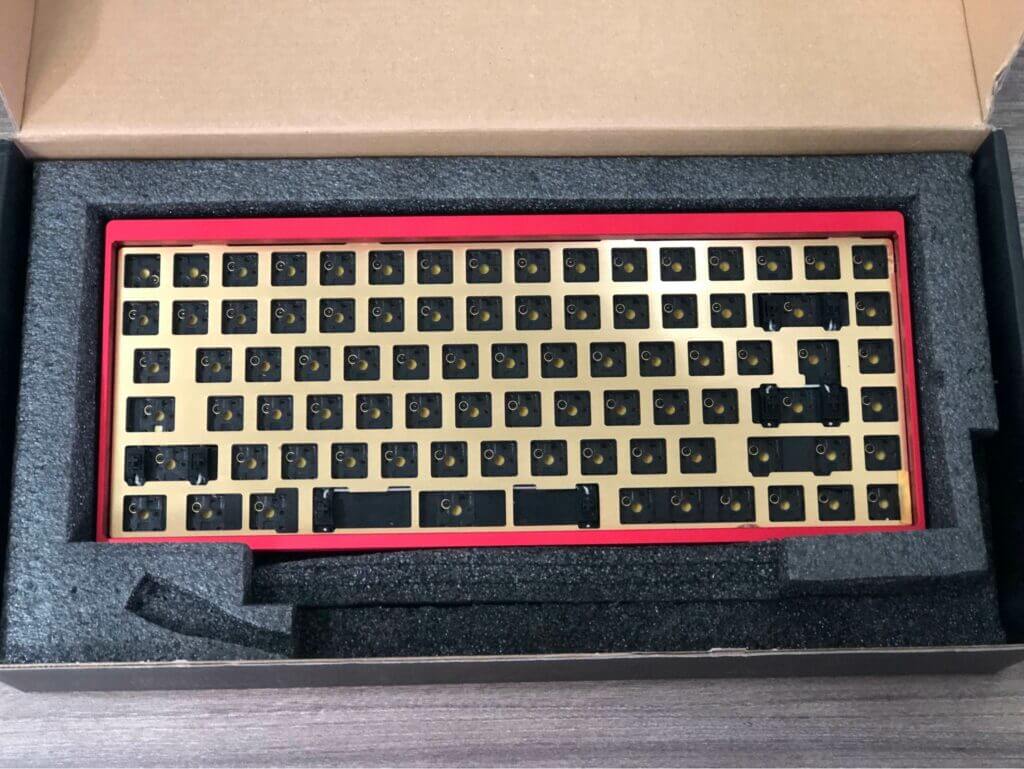
Brass Plate
There are several advantages to using a brass plate in a mechanical keyboard:
Durability: Brass is a strong and durable metal that is resistant to wear and tear. This means that a brass plate can help to increase the overall durability of the keyboard.
Aesthetics: Brass plates can give a mechanical keyboard a classic and premium look, as they are often associated with higher-end products.
Customization: Some mechanical keyboards with removable brass plates allow users to customize the plate with different colors or designs, which can give the keyboard a unique appearance.
Acoustic properties: Brass is known for its distinctive, bright acoustic properties, which can affect the sound of the keyboard when typing. This can be a desirable feature for some users, as it can give the keyboard a more satisfying and tactile feel when typing.
Weight: Brass is a relatively heavy metal, which can give the keyboard a more substantial feel and help to reduce movement during use. This can be beneficial for users who prefer a more stable typing experience.
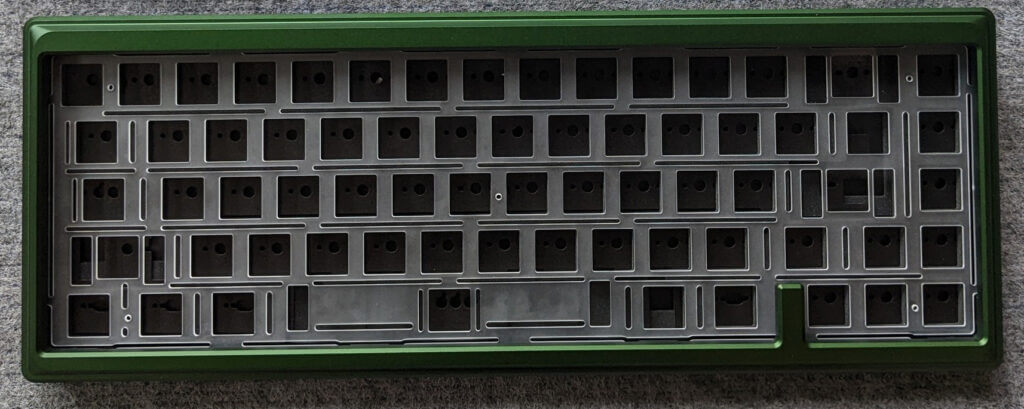
Polycarbonate (PC) Plate
There are several advantages to using a polycarbonate plate in a mechanical keyboard:
Durability: Polycarbonate is a strong and durable plastic that is resistant to impact and wear. This means that a polycarbonate plate can help to increase the overall durability of the keyboard.
Lightweight: Polycarbonate is a lightweight material, which can make the keyboard easier to carry and use.
Customization: Some mechanical keyboards with removable polycarbonate plates allow users to customize the plate with different colors or designs, which can give the keyboard a unique appearance.
Cost: Polycarbonate is typically less expensive than other materials, such as aluminum or brass, which can make it a more cost-effective option for keyboard manufacturers.
Heat resistance: Polycarbonate is resistant to heat and has a high melting point, which can make it a good choice for keyboards that are used in high-temperature environments.
Transparency: Polycarbonate is a transparent material, which can allow the user to see the switches and other components of the keyboard through the plate. This can be a desirable feature for some users who prefer a more minimalistic or “barebones” look for their keyboard.
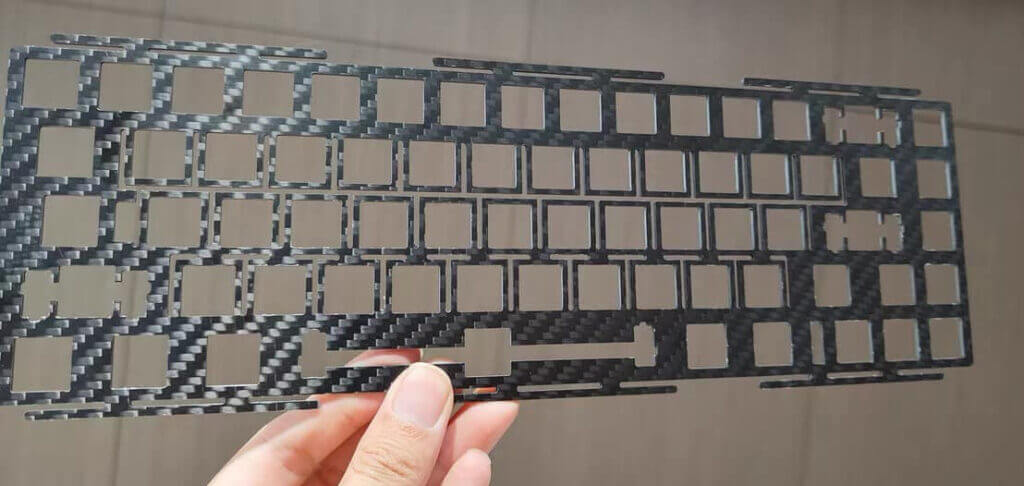
Carbon Fiber Plate
There are several advantages to using a carbon fiber plate in a mechanical keyboard:
Strength: Carbon fiber is a very strong and lightweight material, which can make the keyboard more durable and easier to carry.
Aesthetics: Carbon fiber plates can give a mechanical keyboard a sleek and modern look, as they are often associated with high-performance products.
Customization: Some mechanical keyboards with removable carbon fiber plates allow users to customize the plate with different colors or designs, which can give the keyboard a unique appearance.
Weight: Carbon fiber is a very lightweight material, which can make the keyboard easier to carry and use.
Heat resistance: Carbon fiber has a high melting point and is resistant to heat, which can make it a good choice for keyboards that are used in high-temperature environments.
Cost: Carbon fiber is typically cheaper than other materials, such as aluminum or brass, which can make it a cheaper option for keyboard manufacturers.
FR4 Plate
FR4 is a type of fiberglass-reinforced epoxy resin that is commonly used as a material for printed circuit boards (PCBs) in electronics. It is also sometimes used as a material for mechanical keyboard plates, although it is less common than other materials.
Some possible advantages of using an FR4 plate in a mechanical keyboard include:
Strength: FR4 is a strong and durable material that is resistant to wear and tear. This means that an FR4 plate can help to increase the overall durability of the keyboard.
Customization: Some mechanical keyboards with removable FR4 plates allow users to customize the plate with different colors or designs, which can give the keyboard a unique appearance.
Heat resistance: FR4 has a high melting point and is resistant to heat, which can make it a good choice for keyboards that are used in high-temperature environments.
Cost: FR4 may be less expensive than some other materials, such as aluminum or carbon fiber, which can make it a more cost-effective option for keyboard manufacturers.
It is important to note that FR4 may not be as strong or durable as some other materials, such as aluminum or brass, and it may not provide the same level of support and stability as these materials. Additionally, FR4 may not offer the same level of customization or aesthetics as some other materials.
POM Plate
POM, or polyoxymethylene, is a type of plastic that is sometimes used as a material for mechanical keyboard plates.
Some possible advantages of using a POM plate in a mechanical keyboard include:
Strength: POM is a strong and durable material that is resistant to wear and tear. This means that a POM plate can help to increase the overall durability of the keyboard.
Customization: Some mechanical keyboards with removable POM plates allow users to customize the plate with different colors or designs, which can give the keyboard a unique appearance.
Low friction: POM has a low coefficient of friction, which can make it a good choice for switches that require a smooth and consistent actuation force.
Cost: POM may be less expensive than some other materials, such as aluminum or brass, which can make it a more cost-effective option for keyboard manufacturers.
Heat resistance: POM has a high melting point and is resistant to heat, which can make it a good choice for keyboards that are used in high-temperature environments.
It is important to note that POM may not be as strong or durable as some other materials, such as aluminum or steel, and it may not provide the same level of support and stability as these materials. Additionally, POM may not offer the same level of customization or aesthetics as some other materials.
Conclusion
In conclusion, the mechanical keyboard plate is an important component that serves as a support structure for the switches and helps to evenly distribute the force of keystrokes across the entire keyboard.
It can also contribute to the overall durability, aesthetics, and customization of the keyboard.
There are a variety of materials that can be used for the plate, including aluminum, brass, polycarbonate, and carbon fiber, each of which has its own unique properties and benefits.
Ultimately, the best material for a mechanical keyboard plate will depend on the user’s preferences and needs.
Whether you prefer the sleek look of a carbon fiber plate or the classic feel of a brass plate, there is a material that will suit your style and needs.
